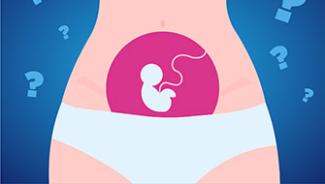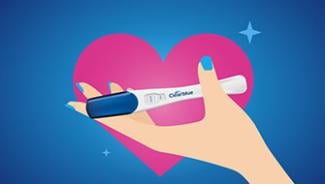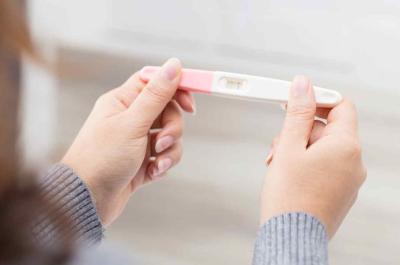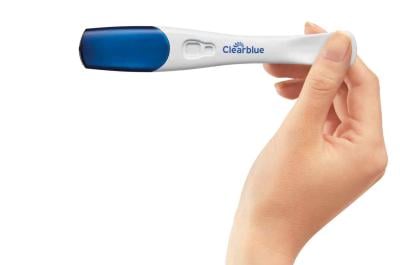Frequently asked questions for Pregnancy Tests

-
How accurate are Clearblue Pregnancy Tests?
All Clearblue Pregnancy Tests are more than 99% accurate at detecting pregnancy, when used from the day of your expected period.
-
I have recently had a miscarriage or termination and I think I might be pregnant again. When should I do a Clearblue Pregnancy Test?
After a miscarriage or termination, it can take up to 9 weeks for the pregnancy hormone hCG to disappear from the body. If you take a pregnancy test during this time, it’s impossible to know if a ‘Pregnant’ result is caused by a new pregnancy or by hCG from your previous pregnancy. In this case, we would recommend that you contact your doctor.
-
I have recently had a baby and think I might be pregnant again. When should I do a Clearblue Pregnancy Test?
After giving birth, hCG may take up to 3 weeks to return to normal levels. If you take a pregnancy test during this time, it’s impossible to know if a “Pregnant” result is caused by a new pregnancy or by hCG from your previous pregnancy. In this case, we would recommend that you contact your doctor.
-
Can drinking too much liquid affect my result?
Yes, it’s important not to drink too much of any liquid including water or alcohol before you take a pregnancy test. It’s better to wait until you naturally need to pass urine. This way, you’ll avoid diluting your level of pregnancy hormone and getting a false ‘Not Pregnant’ result.
-
How do Clearblue Pregnancy Tests work?
When you are pregnant, your body produces the pregnancy hormone hCG (human Chorionic Gonadotrophin). The level of hCG doubles approximately every 24 hours in the first weeks, reaching a maximum at around 7 to 12 weeks into the pregnancy.
Clearblue pregnancy tests work by detecting tiny amounts of the pregnancy hormone in your urine and are over 99% accurate from the day of your expected period.
-
When can I test with Clearblue Pregnancy Tests?
Most Clearblue Pregnancy Tests can be used up to 5 days before your missed period. If you take a pregnancy test before your expected period and get a ‘Not Pregnant’ result, there is still a chance that you may be pregnant because the level of the pregnancy hormone was not high enough for the pregnancy test to detect. See the Clearblue Pregnancy Test product pages for details of results of clinical testing in early pregnancy
To work out when your period is due, calculate your usual cycle length by counting the number of days from the first day of your period, until the day before the next one starts. If you have irregular cycles, you should allow for your longest cycle in recent months before testing.
If you have no idea when your period is due we recommend taking a pregnancy test no less than 19 days after the last time you had unprotected sex.
-
Do I need to use first morning urine?
If testing from the day of your expected period, you can take a pregnancy test with urine from any time of the day. If testing early, use the first urine of the day. Avoid excessive fluid intake before testing. If you are using the Clearblue Pregnancy Test with Weeks Indicator, you will need to use the first urine of the day to get an accurate estimate of how far along you are.
-
My test says I’m pregnant. What should I do?
See your doctor for advice on what to do next.
-
My test says I’m not pregnant. What should I do?
You may not be pregnant or the level of pregnancy hormone may not yet be high enough to be detected, or you may have miscalculated the day of your expected period.
- If you tested early, take a pregnancy test again when your period is due.
- If your period is overdue, take a pregnancy test again in 3 days time. If this test gives you a ‘Not Pregnant’ result and you still have not had your period, see your doctor.
-
I previously tested ‘Pregnant’ but have tested again and got a ‘Not Pregnant’ result, or my period has started. What does this mean?
Whilst the pregnancy test is over 99% accurate at detecting the pregnancy hormone from the day of the expected period, it’s possible to get a pregnant result and find out later that you’re not pregnant (i.e. you may later get a not pregnant result, or your period may start). This may be due to natural loss during the early stages of pregnancy, known as ‘early pregnancy loss’, which sadly is not uncommon, as around 1 in 4 pregnancies end in early pregnancy loss. If you do get unexpected results, ask your doctor for advice.
-
Can any medication or medical conditions affect the results?
- Always read the manufacturer’s instructions for any medication you are taking before taking a pregnancy test.
- Fertility drugs containing hCG can give misleading results (these fertility drugs are usually given by injection, and testing too soon after administration may give a false ‘Pregnant’ result).
- Other fertility therapies (such as clomiphene citrate), painkillers and hormonal contraceptives (e.g. contraceptive pills) should not affect the result.
- If you have recently stopped taking hormonal contraception or are using fertility therapies like clomiphene citrate, your periods may be irregular, leading you to test too soon.
- If you have recently been pregnant (even if not carried to full term) you may get a false ‘Pregnant’ result.
- Ectopic pregnancy, ovarian cysts, menopause and some very rare medical conditions can give misleading results.
If you do get unexpected results you should discuss them with your doctor.
-
How do I read my result?
If using a Clearblue Digital Pregnancy Test, your ‘Pregnant’ or ‘Not Pregnant’ result will be shown in words on the display screen.
If using a traditional Clearblue Pregnancy Test, your ‘Pregnant’ or ‘Not Pregnant’ result will be shown in the Result Window as either a clear +/- result or clear blue line(s).
See Clearblue Pregnancy Test product pages for more information.

Think you might be pregnant?
Discover Clearblue Digital Ultra Early, our most sensitive digital pregnancy test that gives you digital results 6 days early.
Test sensitivity is 10mIU/ml. 78% of pregnant results can be detected 6 days before your missed period.

Find the right pregnancy test for you
Our range of pregnancy tests are especially designed to meet your individual needs, whether you need fast, early, or digital results or more information about your pregnancy.




